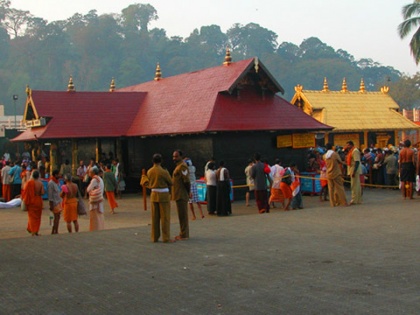Kerala High Court Affirms Caste Requirement for Selection as Melshanthi of Sabarimala Temple
By Lokmat English Desk | Updated: February 27, 2024 17:52 IST2024-02-27T17:40:38+5:302024-02-27T17:52:49+5:30
The Kerala High Court, on Tuesday, rejected a series of petitions challenging a notification issued by the Travancore Devaswom ...

Kerala High Court Affirms Caste Requirement for Selection as Melshanthi of Sabarimala Temple
The Kerala High Court, on Tuesday, rejected a series of petitions challenging a notification issued by the Travancore Devaswom Board, which stipulated that candidates applying for the position of Melshanthi (High Priest) at the Sabarimala Temple must belong to the Malayala Brahmin community [M Viju v. Travancore Devaswom Board]. Justices Anil K Narendran and PG Ajithkumar, presiding over a division bench, delivered the verdict on the petitions arguing that limiting the selection of the high priest to individuals from the Malayala Brahmin community alone violated constitutional rights. The Court dismissed the writ petitions citing insufficient pleadings.
As background, the Travancore Devaswom Board issued a notification on May 27, 2021, inviting applications for the position of Santhikkaran at the Sabarimala Dharmasastha Temple and Malikappuram Temple, exclusively from members of the Malayala Brahmin community. One of the petitions filed in July 2021, represented by advocate BG Harindranath, challenged this notification, alleging that it disregarded Supreme Court judgments and Articles 14, 15, 16, 17, and 21 of the Constitution of India. The plea argued that appointing Melshanthi was considered a secular act and should not have been limited to one particular community, especially in an institution managed by the Travancore Devaswom Board, fully controlled by the Government of Kerala. It further contended that Articles 25 (freedom of religion) and 26 (freedom to manage religious affairs) were not infringed by appointing individuals other than Brahmins to the position, as long as they were fully qualified and trained, regardless of their caste.
Dr. Mohan Gopal, representing some of the petitioners, also argued that the notification violated the constitutional prohibition against practicing untouchability by restricting Melshanthi recruitment to Malayala Brahmin candidates. He emphasized that the Sabarimala temple is non-denominational, open to all Hindus, and the right to be a priest without caste barriers is integral to the right to enter and worship the temple without discrimination based on caste. He further contended that the Supreme Court's decision in N Adithayan v The Travancore Devaswom Board & Ors., upholding the right of a non-Malayala Brahmin to be appointed as a priest in a Shiva temple under the board's administration, was binding on the High Court, as the same board administers the Sabarimala temple.
Open in app